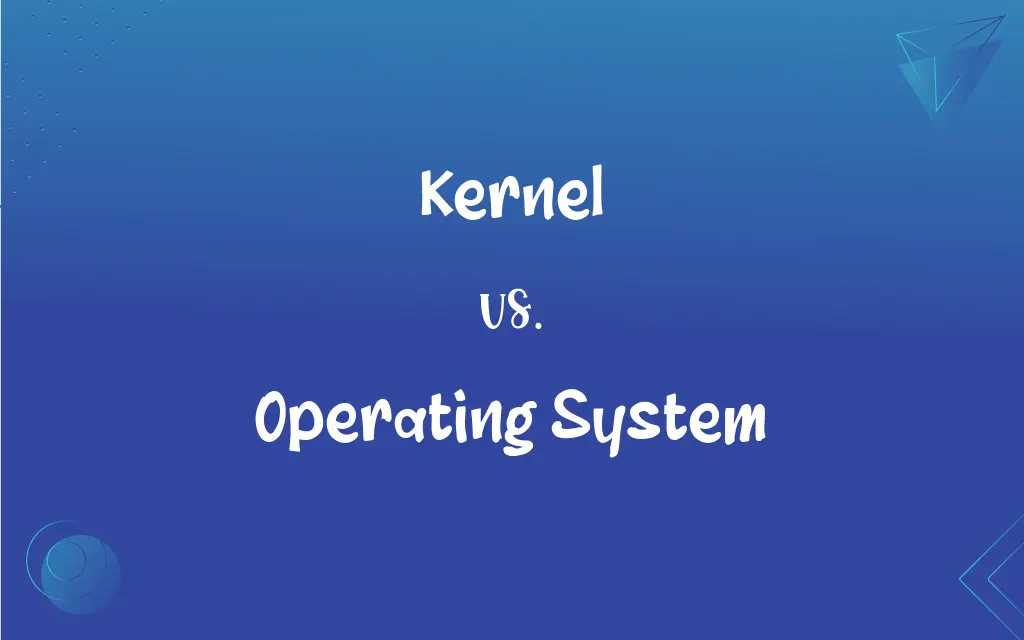Kernel vs. Operating System: What's the Difference?
Edited by Aimie Carlson || By Harlon Moss || Published on February 13, 2024
Kernel is the core part of an operating system, managing system resources and hardware; whereas an operating system is a complete set of programs including the kernel, providing a user interface and application management.

Key Differences
The kernel is the central component of an operating system, responsible for managing the system’s resources, such as CPU, memory, and device drivers. In contrast, an operating system encompasses not only the kernel but also a wide range of software, including system utilities, graphical user interfaces, and application programs, offering a complete environment for users and applications.
The kernel handles low-level tasks like process management, memory management, and device management, ensuring efficient and secure operation of the system, while the operating system provides a user interface, like graphical desktops or command-line shells, and application frameworks, creating an interactive environment for users.
The kernel acts as a bridge between hardware and software, abstracting the complexity of hardware operations from the applications. The operating system, however, extends beyond this, providing a suite of tools and programs that enable users to interact with the system, install applications, and perform various computing tasks.
The development of a kernel requires deep understanding of hardware and low-level programming, focusing on efficiency and stability. An operating system, however, involves a broader range of software development, including user-friendly interfaces, system utilities, and application support, addressing both functionality and user experience.
Kernels come in various types, like monolithic, microkernel, and hybrid, each with different approaches to handling system calls and hardware interaction. Operating systems, such as Windows, macOS, and Linux distributions, integrate these kernels with additional software, providing diverse features and user experiences.
ADVERTISEMENT
Comparison Chart
Scope
Core system management
Complete software system
Function
Manages hardware and system resources
Provides user interface and app management
User Interaction
No direct user interaction
Direct user interaction via GUI or CLI
Complexity
Focused on efficiency and stability
Includes wide range of functionalities
Example
Linux kernel in a Linux OS
Entire Linux operating system with GNOME
ADVERTISEMENT
Kernel and Operating System Definitions
Kernel
Kernel is a low-level system software providing basic services to other parts of the OS.
The kernel allocates memory to applications, ensuring optimal performance.
Operating System
Operating system acts as an interface between the user and the computer hardware.
MacOS allows users to interact with their Macs using intuitive gestures and commands.
Kernel
Kernel acts as an intermediary between hardware and application software.
When a program requests file access, the kernel communicates with the disk hardware.
Operating System
Operating system coordinates and directs the use of the computer's resources.
Linux efficiently allocates CPU and memory resources among running applications.
Kernel
Kernel is the central part of an OS, managing hardware and system processes.
The Linux kernel efficiently handles system resources, ensuring smooth multitasking.
Operating System
Operating systems vary widely, from those in computers to those in mobile devices.
IOS, an operating system for iPhones, is optimized for touch-based interaction.
Kernel
Kernel is responsible for managing system security and access control.
The kernel prevents unauthorized access to system hardware and data.
Operating System
An operating system is a collection of software that manages computer hardware and provides services for computer programs.
Windows 10 is an operating system that offers a user-friendly interface and various utilities.
Kernel
Kernel varies in type, including monolithic, microkernel, and hybrid.
The Windows NT kernel is a hybrid kernel, combining aspects of monolithic and microkernels.
Operating System
Operating system is responsible for the execution and management of multiple application programs.
Android OS manages various applications on a smartphone, ensuring smooth operation.
Kernel
A grain or seed, as of a cereal grass, enclosed in a husk.
Kernel
The usually edible seed inside the hard covering of a nut or fruit stone.
FAQs
What does an operating system do?
An operating system manages computer hardware, provides a user interface, and oversees application software.
What is a kernel?
A kernel is the core part of an operating system, responsible for managing hardware and system processes.
How does a kernel differ from the full operating system?
The kernel is the core component that manages hardware, while the operating system includes the kernel along with other software for a complete user environment.
Are there different types of kernels?
Yes, including monolithic, microkernel, and hybrid kernels, each with different approaches to system management.
Can a kernel be changed in an operating system?
Generally, the kernel is integral to the operating system, but some systems like Linux allow for custom kernels.
Do all operating systems use the same kernel?
No, different operating systems use different kernels, like the Windows NT kernel or Linux kernel.
Can an operating system function without a kernel?
No, the kernel is essential for an operating system to interact with the hardware and manage resources.
What role does a kernel play in multitasking?
The kernel manages CPU and memory to allow multiple applications to run simultaneously.
Is the user interface part of the kernel?
No, the user interface is part of the operating system; the kernel operates at a lower level.
Can users interact directly with the kernel?
Users generally interact with the operating system, not directly with the kernel.
Do operating systems come with pre-installed software?
Yes, operating systems often come with a set of pre-installed software and utilities.
What is an example of an operating system?
Windows, macOS, and Linux are examples of operating systems.
What are some common operating systems for mobile devices?
Android and iOS are common operating systems for mobile devices.
How does the kernel manage system security?
The kernel manages access to hardware and system resources, preventing unauthorized use.
What's the difference between a kernel and firmware?
Firmware is low-level software directly embedded in hardware, while a kernel is higher-level software managing the system and hardware.
Are there operating systems designed for specific purposes?
Yes, there are operating systems designed for specific purposes, like server management or mobile devices.
How does the kernel handle hardware drivers?
The kernel includes or interfaces with drivers to communicate with hardware devices.
What is the role of an operating system in application management?
The operating system manages application execution, resource allocation, and provides necessary services to applications.
How does a kernel affect system performance?
The efficiency of the kernel directly impacts the overall performance and stability of the system.
Can kernels be upgraded independently of the operating system?
In some cases, like with Linux, kernels can be upgraded independently, but it typically depends on the operating system design.
About Author
Written by
Harlon MossHarlon is a seasoned quality moderator and accomplished content writer for Difference Wiki. An alumnus of the prestigious University of California, he earned his degree in Computer Science. Leveraging his academic background, Harlon brings a meticulous and informed perspective to his work, ensuring content accuracy and excellence.
Edited by
Aimie CarlsonAimie Carlson, holding a master's degree in English literature, is a fervent English language enthusiast. She lends her writing talents to Difference Wiki, a prominent website that specializes in comparisons, offering readers insightful analyses that both captivate and inform.
































































